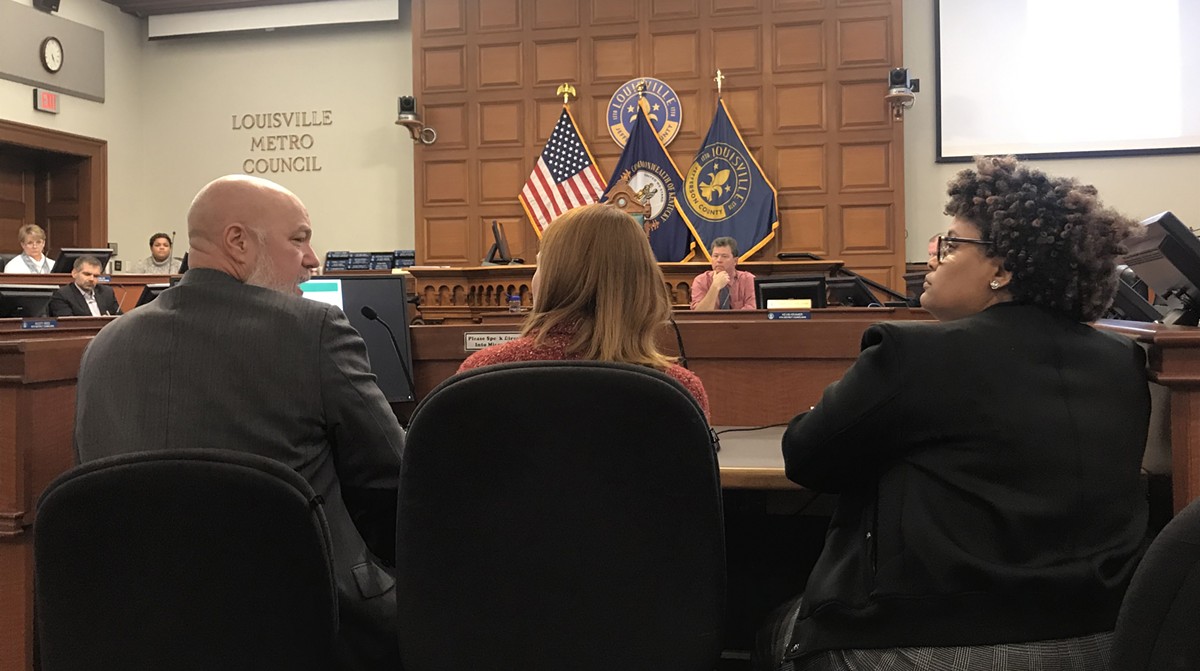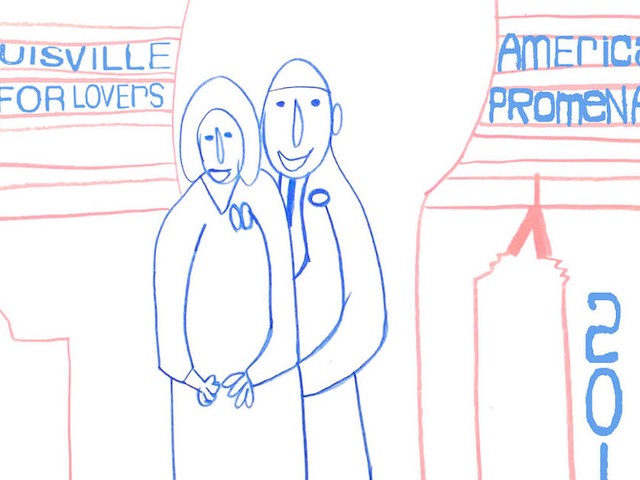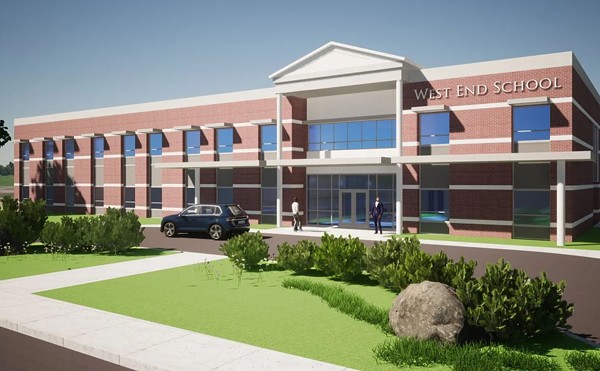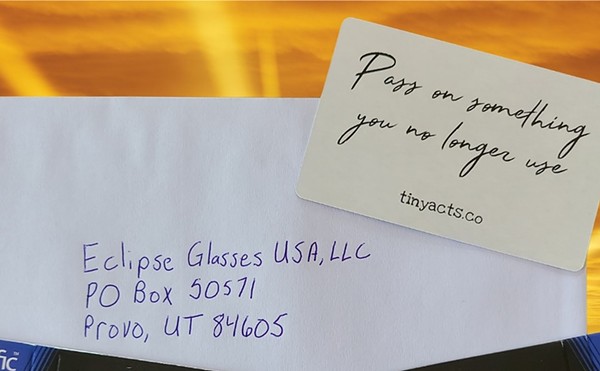As the last near-zero temperatures from the polar vortex penetrated Louisville early Thursday morning, 118 people were found staying outside.
That number from the Coalition for the Homeless’ annual count was 35 fewer than during last year’s January count — “an important sign of progress,” according to a news release from the Coalition.
Thursday’s count came as the city has moved — with mixed results — to open low-barrier shelters, those that allow people in under fewer regulations than typical shelters.
As volunteers conducted the count, they made efforts to convince people to come inside. Officials said that there probably would have been enough room for the unsheltered homeless people to stay indoors on Wednesday evening. Those who were outside gave varying reasons to LEO as to why they tolerated the frigid temperatures, including that they feared the other people in shelters and just wanted to stay independent.
Natalie Harris, executive director of the Coalition for the Homeless, said that, while this year’s numbers were down, they were not down enough.
“I mean, can you imagine 118 people out there last night?” Harris asked in an interview with LEO.
At Thursday’s Metro Council Budget Committee meeting, Harris and Eric Friedlander, Louisville’s chief resilience officer, presented an update on $500,000 that the Metro Council approved for homelessness services.
The city had 20 days from the time the Council approved the funds Dec. 13 to come up with a plan on how to spend the money. From that day, Jan. 2, the selected providers had only 12 days to implement their goals.
Friedlander acknowledged some challenges, explaining that one shelter could not open because of safety code issues and storage for homeless people’s belongings was not ready yet.
But, Wayside Christian Mission’s low-barrier shelter, for example, housed 161 people on Thursday morning, even though Wayside advertises space for 100.
Councilman Bill Hollander, chair of the Budget Committee, praised the city for what it’s been able to accomplish.
“I will point out I guess today is the 49th day since we passed this appropriation, so I wish everything in government moved this quickly,” he said.
Here is a look at what’s been accomplished and what hasn’t.
The goal: A 100-bed low-barrier shelter at Wayside Christian Mission Has it been accomplished?: Yes On Christmas Eve, before Wayside knew that it would receive city funds, the organization opened a 100-bed low-barrier shelter.
On its first day in operation, the shelter served 80 to 90 people. The shelter accepts partners, pets, people who are intoxicated and those who have been banned in the past.
Wayside started out only offering mats to sleep on, but it now contains some beds. The organization is working on offering storage.
“They’ve stepped up to the plate to do something different that I will tell you, three months ago, they said they wouldn’t do,” Friedlander said. “So they’ve changed their mind, they’ve changed some of how they’re operating. So I just want to say, that we should be appreciative of what they’re doing.”
The goal: A 24-bed emergency shelter for men at The Healing Place Has it been accomplished?: Yes The Healing Place started offering 24 extra beds on Jan. 14. It started quickly because The Healing Place recently moved its detox operations to another building, said Director of Communications Marla Highbaugh. Between the new emergency shelter beds and 24 more overnight beds that the shelter offers, the shelter has been averaging 38 people a day.
The goal: A 24/7 shelter for six families at the St. Stephen Family Life Center Has it been accomplished?: No The St. Stephen Family Life Center opened a 27-bed emergency shelter Wednesday, but the overnight shelter that the center planned is not happening — for now. Instead, the organization is opening a day shelter for families on Monday. This is because the building has not met safety codes for so many people to stay overnight. Another exit and a sprinkler system are needed.
“I did not foresee that coming,” said Friedlander. “I feel like I should have.”
A family day shelter was a missing component of the city’s homeless services system, however, Friedlander said.
The Life Center has told the city it wants to open an overnight shelter, but the changes would be expensive.
Its emergency shelter will close when it is warm enough.
The goal: Shelter for 10 families at Hotel Louisville, provided by Volunteers of America Has it been accomplished?: Halfway Volunteers of America has moved only five families into Hotel Louisville. That may sound like an unaccomplished goal, but Friedlander said the plan was never, necessarily, to move 10 families at once.
“It was about rapid-rehousing and moving some of their current families and making more space,” Friedlander said. (VOA runs another emergency shelter for homeless families in Louisville).
The goal: A storage facility for the homeless (where they can keep items that prevent them from leaving their camps and going to shelter) Has it been accomplished?: No Opening a storage facility has proved challenging, said Friedlander, and the St. John Center for Homeless Men’s plan for a way to store items has changed.
The city now plans to convert shipping containers into the needed storage.
The containers were supposed to be moved on Wednesday to the Louisville Housing Authority’s parking lot at 431 E. Liberty St., but they were frozen to the ground. The city hopes to move them next week and to open them this month.
The goal: An outreach team of workers connecting homeless men and women to shelter, housing and support services, from St. John Center for Homeless Men and Uniting Partners for Women and Children. Workers would also serve as connectors to the Common Assessment Team, The Living Room, overnight shelters, housing counselors, medical/mental health services, substance abuse treatment and other various community partners Has it been accomplished?: Sort of The organizations have professional case managers and peer support workers who have been going out to try to bridge communication among the various organizations, but Friedlander said there’s a need for some additional support from the groups.
Louisville has seen some success with getting people off the street and in stable housing that they otherwise wouldn’t have been able to, because of these efforts, Friedlander said.






